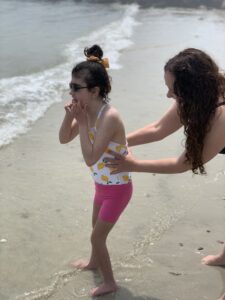Before you read on, make sure to check out Part 1 of Savannah’s story. In Part 1, Savannah’s mom Lacey shared the diagnostic journey that led to Savannah’s diagnoses: EoE, LGS, and Ogden syndrome, among others. Today, we discuss what Ogden syndrome is, parenting a medically complex child, and why Lacey is so passionate about advocacy.
What is Ogden Syndrome?
Also known as n-terminal acetyltransferase deficiency, Ogden syndrome is an ultra-rare X-linked disorder caused by a single spelling error on the NAA10 gene. Typically, Ogden syndrome is more severe in males than females, given that females have two X chromosomes.
Ogden syndrome is still somewhat poorly understood. Therefore, while the following symptoms are often seen in children with Ogden syndrome, there may be additional symptoms that may appear. Symptoms can include:
- Hypotonia
- Failure to thrive/slowed growth
- Developmental delays
- Cardiac arrhythmias
- Intellectual disability
- Autism spectrum disorder
- Feeding and swallowing difficulties
- Seizures
Lacey hypothesizes that Ogden syndrome and CVI can be related. Many children with Ogden syndrome also have CVI who do not have the same birth history as Savannah. Similarly, many individuals with Ogden syndrome also have epilepsy. Lennox-Gastaut syndrome (LGS) could be related, as many children with Ogden syndrome seem to have a seizure disorder of some sort, even though most are not specifically diagnosed with LGS. Outside of that, there are various overlaps between children—many have autism and prolonged QT—but there are some differences. Ogden syndrome is a spectrum, like most disabilities, and no two children present exactly alike.
Ogden Syndrome Treatment Options
Right now, there is no cure for Ogden syndrome. Treatments are symptomatic. Savannah currently uses a beta blocker for her heart and medication to help with EoE management. Lacey explains that currently managing Savannah’s seizures are the most difficult aspect:
Lennox-Gastaut syndrome is hard to manage with medication, so we’re navigating the best outcome for her seizures. Our ultimate goal is better seizure control for her.
To identify therapeutic options for Ogden syndrome requires additional research. However, it can be difficult to kickstart that research given how rare the condition is. Research has thus far shown some of the commonalities between affected children but has not advanced enough to study the disease or understand the impact of potential drugs. Lacey shares:
I want people to be involved in research more than anything. I’d love to see whether drug treatments can lessen her seizures or can help other children reduce their symptoms. Early on, we were trying to figure out how to support Savannah but are now at the point where we want to see drug development.
Parenting a Medically Complex Child
In sharing her story, Lacey wants to raise awareness of what it means to raise a medically complex child. She explains:
“Some people don’t understand the extent of day-to-day care. I’ve done videos of carrying her up the stairs or to the car, since we’re still raising funds for a wheelchair-accessible van, but there’s a lot of care and commitment that goes into that. She is 100% dependent on us. We dress her, diaper her, feed her, and give her medications. But she is worth every moment. Savannah is so easygoing and carefree.”

While some people may think that raising a medically complex child is difficult, Lacey says that navigating the healthcare system is actually way more tiring. She explains:
“Fighting with the insurance companies and going to doctor appointments is much more exhausting than raising my daughter. The system is broken, and it can be a battle just to get anything done. There needs to be way more support for caregivers.”
Being an Advocate
Prior to having Savannah, Lacey didn’t know much about rare diseases. Her experience has launched her into advocacy work, from advancing the mission of Ogden C.A.R.E.S. to finding ways to spread positivity. She explains:
“This is nothing that we can control, so we just work with it. I am blessed that Savannah is here with us and I want to shine a positive light on this experience. I know it’s hard, but she brings me more joy than hardship. You just have to look for it a little harder sometimes.”
For parents who are at the very start of their own rare journey, this may seem tough at first. Lacey encourages everyone to seek support within the wonderful and united disability community, saying:
“Find who is in your corner. If your doctor isn’t listening, go somewhere else. Search in support groups and find people who believe in you and find others who share similar diagnoses. There is a lot of support and care if you look for it. And if you need help, you can reach out to me or to Ogden C.A.R.E.S. and we are there. Find the joy in your child and try not to let the day to day overwhelm you. Keep your chin up, move forward, and help your child the best you can.”


